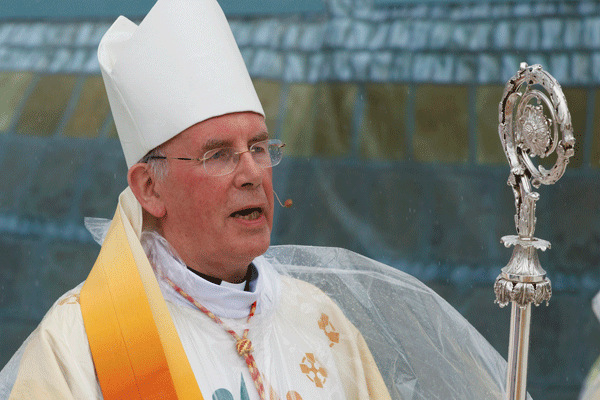
DUBLIN (CNS) — As the daily theme for the 50th International Eucharistic Congress switched to reconciliation, Irish Cardinal Sean Brady told pilgrims he was ashamed that the church had failed to respond properly to abuse allegations.
“May God forgive us for the times when we, as individuals and as a church, failed to seek out and care for those little ones who were frightened, alone and in pain because someone was abusing them,” the cardinal, primate of All Ireland, told pilgrims in a rain-swept stadium June 14.
Cardinal Brady came under sustained pressure to resign from abuse victims’ groups because he knew about the crimes of one notorious abuser, Father Brendan Smyth, in 1975 but did not report him to the civil authorities. Father Smyth went on to abuse children for many years before being finally jailed in 1994.
Addressing abuse victims, the cardinal said: “That we did not always respond to your cries with the concern of the Good Shepherd is a matter of deep shame. We lament the burdens of the painful memories you carry. We pray for healing and peace for those whose suffering continues.”
Earlier, the congress secretary-general, Father Kevin Doran, confirmed that there were a number of abuse victims present at the event in a personal capacity. He declined to identify them, insisting that organizers did not want the victims’ presence to be misinterpreted as a public relations exercise.
Referring to a large healing stone placed at the front of the altar to commemorate the victims of clerical abuse, Cardinal Brady prayed that “one day this stone might become a symbol of conversion, healing and hope.”
“I hope it will become a symbol of a church that has learned from the mistakes of the past and strives to become a model for the care and well-being of children,” he said.
Cardinal Brady’s homily was greeted with sustained applause by an estimated 10,000 pilgrims at the open-air Mass, celebrated in the Irish language with music by traditional Irish musicians. The cardinal welcomed the many overseas pilgrims, “especially those of you for whom this is the first time to hear the Mass celebrated in the original language of the Irish people.”
“We hope that through the universal language of sign, symbol and gesture of our Catholic liturgy, which is itself a source of our communion with Christ and with one another, you will enter with us in to these sacred mysteries,” he said.
Heavy rain failed to deter pilgrims, and organizers said the number of people attending has increased each day. While many pilgrims arrived by train and bus, a large group of parishioners arrived after a two-week walk from Bangor, Northern Ireland.
Concelebrants at the June 14 Mass wore plastic ponchos over their chasubles to shield them from the rain. Earlier in the day, a large screen was erected for the many pilgrims who were unable to get a seat at the various workshops and talks.
The evening of June 13 Irish police estimate that 12,500 people participated in a eucharistic procession through the streets of Dublin. Many pilgrims carried banners representing their parishes, and the event included boys and girls who had recently made their first Communion.
Richard Moore, who was blinded as a child in 1972 when he was shot in the face by a British soldier in Londonderry, Northern Ireland, reflected on the importance of reconciliation in his own life. Moore said that, despite his ordeal, he “never had a moment’s anger or a moment’s bitterness.”
He recounted how he met and forgave the soldier decades later.
“To sit in a hotel foyer, opposite the man who pulled the trigger and blinded me for life and caused all those hurts to me and my family — and to like him — was an incredible experience,” Moore said.
Speaking to Catholic News Service, he said it was “the power of prayer” that has sustained him and allowed him to forgive.
“There is so much that is good in the church that I experience on a daily basis,” he said.
“Things need to change in the church; there needs to be a lot more honesty and a lot more openness, but I am hopeful for the future of the church,” he said.
His sentiments were echoed by pilgrims. Mary Walsh of Cork, Ireland, told Catholic News Service the eucharistic congress had been “an opportunity for people to come together and share and celebrate the beauty of our Catholic faith. People rightly criticize the church for its failings,” she said, “but the fact that the faith is often inadequacy lived does not take away from the truth of it.”
Tom O’Sullivan of Belfast, Northern Ireland, said the congress was “allowing the silent majority of the country to come together and share their love for the Eucharist and the Mass.” He said he had been heartened and felt his spirits lifted by participating in the events.
— By Michael Kelly, Catholic News Service





